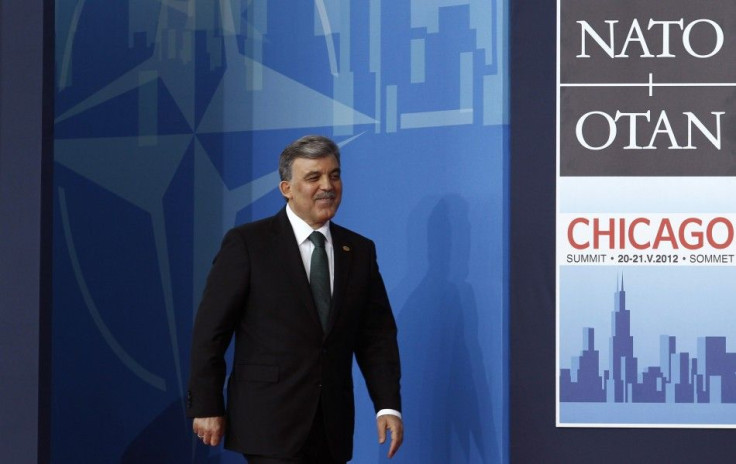Why Is Turkey In NATO?

Following one, maybe two, apparently unprovoked attacks on Turkish jets by Syrian military forces, the Ankara government has called an emergency meeting of NATO in Brussels to discuss how to respond to these provocations.
Under Article 5 of NATO’s charter, an attack on one member of the alliance could be construed as an attack on the whole group, leading to possible joint retaliation against the offending party (in this case, Syria).
However, one may wonder why Turkey -- a country that is about 2,000 miles to the east of the Atlantic Ocean -- finds itself in an entity called the “North Atlantic Treaty Organization.”
Actually, Turkey and its neighbor Greece (another nation remote from the shores of the Atlantic) joined NATO in February 1952, marking the first time the alliance made any kind of enlargement.
NATO was first formed in April 1949 with 12 original members (two North American nations and 10 states in Northern or Western Europe).
The decision to allow Greece and Turkey into alliance stemmed largely from Cold War strategies against the Soviet Union. Greece and Turkey (both with firmly anti-Communist governments) were viewed by the West as bulwarks against Moscow and the spread of communism in Europe. Considering that the Korean War was on the horizon, fears of China and Russia expanding their influence into other parts of the world were realized. (Both Greece and Turkey contributed troops to fight in Korea).
“The main purpose for establishing NATO was to counter the threat of USSR / Communist expansion after World War II,” said Dr. Dilshod Achilov of the Department of Political Science, International Affairs And Public Administration East Tennessee State University. “The roots of accepting non-North Atlantic nations into NATO, mainly Greece and Turkey to begin with, lies at the heart of the Truman Doctrine -- extending military and economic aid to states vulnerable to Soviet threat / expansion.”
Turkey has maintained its membership in the alliance ever since.
Indeed, Turkey's strategic location boosted NATO's leverage against the Soviet Union after the Second World War.
“NATO membership would guarantee, in essence, that Turkey would not become a Soviet ally,” Achilov noted.
In a statement commemorating Greece and Turkey’s 60th anniversary of joining NATO, the alliance stated: “Turkey and Greece have greatly contributed to Alliance security during six decades, guarding NATO’s southern flank during the Cold War and, today, addressing new challenges such as violent extremism, or contributing to missile defense and stabilizing Afghanistan.”
Ambassador Haydar Berk, the permanent representative of Turkey to the North Atlantic Council, expressed his country’s commitment to the alliance.
NATO is one of the essential dimensions of Turkish foreign and defense policy,” he said.
“Turkey has been an important member of the Alliance and a reliable ally for 60 years.
Indeed, Greece and Turkey’s accession to NATO predated West Germany’s joining by three years. In 1955, West Germany (only 10 years after the fall of the Nazi regime) became a member of NATO, a development that led Moscow to retaliate by forming the Warsaw Pact (the Communist answer to NATO).
However, given the contentious ties between ancient rivals Greece and Turkey, the Greeks bolted from NATO in 1974 following the Turkish invasion of the island of Cyprus, where the Turks formed a separate state called the Turkish Republic of Northern Cyprus (an entity recognized by no one but Ankara).
Greece rejoined NATO in 1980 (with Turkey’s cooperation).
After the fall of the Berlin Wall in 1989 and the subsequent collapse of the Soviet empire, the “North Atlantic” nature of NATO was further diluted by the mass entry of many of the former Warsaw Pact nations into the alliance (excluding Russia, of course) in 1999 and 2004.
Jamie Chandler, a political scientist at Hunter College in New York City, also said that Turkey’s membership was pivotal in terms helping NATO deal with political instability in Eastern Europe, the 1990s Balkan wars, and post-9/11 activities focused on the Middle East.
“Turkey’s secular-Islamic government provides NATO [with] a cultural and political bridge into the Arab world, and NATO installations in the country give the organization an efficient means to deal with instability in the region,” he added.
© Copyright IBTimes 2024. All rights reserved.





















